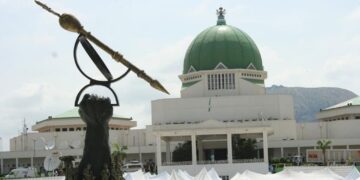[ad_1]
The Central Bank of Nigeria (CBN) on Saturday said it is working assiduously to increase the circulation of the new notes in the country. CHIMA NWOKOJI in this report weighs this position in line with the Council of State’s advice, Supreme Court order.
EVER since the Supreme Court of Nigeria entered an interim order against the Central Bank of Nigeria, banning the Bank from going ahead with its deadline for the end of use of the old naira note until February 15, 2023, the apex bank has not made any official statement in that regard.
But on Saturday it came out to debunk rumours around the capacity of the Nigeria Security Printing and Minting Company (NSPMC) to print more money.
“For the avoidance of doubt, the CBN remains committed to performing its monetary policy functions, as stipulated in the CBN Act, 2007, as amended.
“We also wish to restate that the NSPMC has the capacity and enough materials to produce the required indent of the Naira,” it emphasized in a statement.
Despite the scarcity of Nigeria’s legal tender, the CBN said it is working with the Deposit Money Banks and other very important stakeholders such as the Economic and Financial Crimes Commission (EFCC), the Independent and Corrupt Practices Commission (ICPC) and the Nigerian Financial Intelligence Unit (NFIU) to ensure that the ultimate goal, which is to deliver to all Nigerians , a new currency that meets global standards is achieved.
However, in view of the difficulties being faced by Nigerians and the deadlock brought about by a supreme court order last week, the National Council of State has advised the Federal Government to make new naira notes available or re-circulate the old notes to ease the sufferings of Nigerians nationwide as a result of scarcity of cash.
It however, agreed with CBN that there is no better time than now for the country to redesign its currency and advance the cashless policy objectives.
The National Council of States is an organ of the Nigerian Government. Its functions include advising the executive on policy-making. Although the Council has no executive power, it plays an important advice and consent role in government operations.
Origin of the council
In the First Nigerian Republic, there was no National Council of State as the Premiers occasionally met with the Prime Minister of Nigeria, Sir Abubakar Tafawa Balewa.
General Murtala Muhammed, first introduced the idea of the National Council of State, on 30 July 1975, in a broadcast to the nation after deposing General Yakubu Gowon:
It also advises the Federal Government on policy issues. Fast Forward to February 2023, the president, vice-president, governors, Secretary to the Government of the Federation, former presidents, former heads of state, former Chief Justices of Nigeria, President of the Senate, Speaker of the House of Representatives as well as the Attorney-General of the Federation are among members who sat and deliberated on the current naira imbroglio.
Meanwhile, the Kano State government joined the suit at the Supreme Court against the Federal Government regarding the deadline if naira swap policy. The state joined Kaduna, Kogi and Zamfara state governments on the substantive suit, which would be heard by the apex court on Wednesday, February 15.
The Supreme Court had issued an ex-parte order restraining the Federal Government from enforcing the February 10, 2023, deadline for the old notes to cease to be legal tenders.
In suit number SC/CS/200/2023, filed last week Thursday, the Kano State Attorney General, through his Counsel, Sunusi Musa, is praying the apex court to declare that the President of Nigeria cannot unilaterally direct the CBN to recall the now N200, N500 and N1000 old bank notes without recourse to the Federal Executive Council (FEC) and National Economic Council (NEC), respectively.
The applicant is also seeking for a mandatory order compelling the Federal Government to reverse the naira redesign policy for alleged failure to comply with 1999 Constitution (as amended).
It is also praying the court to issue a mandatory order seeking for a reversal of the policy for affecting the economic well being of over 20 million of Kano residents.
The independence of CBN
Experts have said that all these developments impinge on the independence of the central bank.
Proponents of independence of the central bank argue that it was the initiative and effectiveness of the Central bank’s monetary policies that helped in averting enormous economic and financial losses.
Although, there has been arguments that the independence of Nigeria’s central bank has been compromised, the CBN Act 2007 provides that the apex bank shall be a fully autonomous body in the discharge of its functions under the Act and the Banks and Other Financial Institutions Act with the objective of promoting stability and continuity in economic management.
CBN’s position and rationale for naira redesign policy
The apex banking sector regulator has however said that the difficulties been faced by Nigerians are transient given its strong believe that the ultimate gain of the policy to Nigeria far outweighs the short run pains of today.
Currency management is a key function of the Central Bank of Nigeria, as enshrined in Section 2(b) of the CBN Act 2007. From the on-set of this currency redesign program, the CBN made it clear that for over 19 years, it has not been able to undertake this important currency and liquidity management function that has important ramifications for the effectiveness of monetary policy.
“Our principal aim, with the currency redesign initiative, is to make our Monetary Policy decisions more efficacious and like you can see; we have started to see inflation trending downwards and exchange rates relatively stable.
“Secondly, we aim to increase financial inclusion in the country by reducing the number of the unbanked population.
“Thirdly, our aim is to support the efforts of our security agencies in combating banditry and ransom-taking in Nigeria through this program and we can see that the Military are making good progress in this area,” Godwin Emefiele stated at a recent press briefing in Lagos.
He said the bank held several meetings with Deposit Money Banks (DMBs) and provided them with Guidance Notes on processes they must adopt in the collection of old notes and distribution of the New Notes to all Nigerians.
These include specific directives to DMBs to load new notes into their ATMs nationwide to ensure an equitable/transparent mechanism for the distribution of the new notes to all Nigerians. This approach was initially adopted following reports that some DMBs were favoring their Prime customers at the expense of their small account holders at bank branches. After some time, and in a meeting with the DMBs, CBN decided to allow withdrawals over the Counter but subject to no more than N20,000.
CBN’s efforts
The CBN commenced a nationwide sensitisation through the Print and Electronic Media to create an awareness on the redesigned Notes to Nigerians including collaboration with the National Orientation Agency to reach all Nigerians across multiple channels.
It deployed 30,000 Super Agents nationwide to assist in Cash Swap initiative in the hinterlands, rural areas, and regions underserved by banks in the Country to ensure that the weak and vulnerable ones can swap/exchange their old notes.
“We deployed all our staff, particularly the Assistant Directors, Deputy Directors, and Directors in Abuja to proceed to all CBN branches Nationwide to join the mass mobilisation campaign and monitoring programs, working with the Deposit Money Banks, Agents, and our Branch Controllers across the 36 states of the Federation. “This is meant to ensure compliance with all our guidelines already issued for smooth implementation of the program.
Benefits of a currency redesign policy
Generally, currency redesign policies (sometimes called demonetization policies) are designed by countries to strengthen the performance of key macroeconomic parameters and equally combat social improprieties. Chiefly, it is expected to reduce the amount of cash in underground or illicit economy, truncate the activities of racketeers, and obliterate rent-seeking businesses in the black market.
By reducing currency outside banks, it will shrink money stock and accordingly lower the long-run path of inflation. The ensuing deflationary pressure could elicit interest rate cuts that will in the short- to medium-term boost economic activities, spur aggregate demand, and enhance output growth.
According to experts, the macro-economic impacts of currency redesign are multidimensional and could seem uncertain especially at this early stage when its inconvenience is widespread.
By spurring more people to use bank accounts, this policy will further increase bank account ownership and increase the use of accounts by enhancing people’s saving behavior.
It could encourage some hitherto informal business operators to formalise the pattern of transactions and adopt more formal settlement channels.
In addition, the short-term decline in cash holding and the increased formalisation of business activities as the cashless policy forces more economic agents to open bank accounts, will also boost fiscal policy.
With more transactions going through e-channels and bank accounts, more agents come within view of the government’s tax net. This enlarges the base of taxable activities and increases the possibility of more tax receipts by various tiers of government.
In the long-term, the policy will improve the sophistication of tax collection and would no doubt reduce tax evasion and tax avoidance. As experiences from other jurisdictions have shown, effective currency redesign can support regulatory reform, increased legislative reach and coordinated fiscal and structural policies.
Experts have also said that effectively implemented currency redesign causes a fall in money supply. This will lead to reduction of value of money in circulation and a deceleration of the velocity of money in the economy leading to less pressures on domestic prices.
The Supreme Court and naira redesign
Last week, the Supreme Court of Nigeria entered an interim order against the Central Bank of Nigeria banning the Bank from going ahead with its deadline for the end of use of the old naira note until February 15, 2023, after the deadline set by the Central Bank.
This order was granted Ex-Parte, which means the Supreme Court did not hear from the Central Bank or an agent of the federal government. The court restrained the bank from going ahead with its policy ending the use of the old notes as from February 10, 2023. The February 10,has come and gone, the old naira note is still been accepted as a means of exchange.
Dr Sam Amadi, former Chairman of the Nigerian Electricity Regulatory Commission (NERC) in a position paper seen by Nigerian Tribune argued that the power of the Supreme Court does not require it to take over technical decision-making from the designated decision-maker, especially when the subject matter is one that requires insulation from politics and is not judicially manageable like that of the CBN.
According to him, “This is the basis of the principle of judicial deference to the expertise of regulatory institutions as espoused by the US Supreme Court in Chevron v. Natural Resources Defense Council 467 U.S. 837 (1984).”
He said that agencies of government should be sued in their own name, especially when they are independent agencies whose relationship with the federal government is necessarily distance in order to achieve the strategic independence required for good monetary policymaking.
“The Supreme Court ought to refuse to take on the case in its original jurisdiction because it is not the sort of matter that the constitution prescribed to be taken on the original jurisdiction of the Supreme Court.”Again, the plaintiffs’ lawyer argued that the case was premised on the general suffering of Nigerians on account of the naira redesign policy and warned that anarchy looms,” he submitted.
Amadi further explained that there is no abridgment of the rights and entitlement of the three states that approached the Supreme Court in any manner by the federation, adding that there is no action of the federation that is being alleged to have caused special harm or special deprivation in those states that could warrant going to the supreme court.
“The issue borders on the exercise of regulatory power over currency, an issue within the exclusive jurisdiction of the federal government under the 2nd Schedule to Part 2 of the Constitution.
“By virtue of Section 251 of the Constitution, the proper court to exercise jurisdiction over matter of currency between the agent of federal government and any person or entity is the Federal High Court, not the Supreme Court. As long as the matter is on a currency policy by the federal government, the proper venue for adjudication is the Federal High Court, not the Supreme Court,” he submitted.
Tribune







